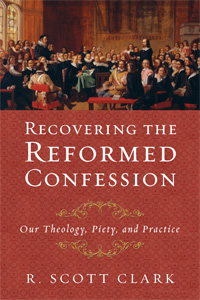When the young neo-Evangelicals, Billy Graham, Carl F. H. Henry, & co. established Christianity Today in 1956 they did so to offer an alternative to the more liberal Christian Century magazine. In its early years there was a strong confessionally Reformed presence . . . Continue reading →
Defining “Reformed”
Post-Thanksgiving Cartoons: Reply to James White
Yes, I’m aware that James White has posted a caricature of my views. Thanks to everyone who wrote to make sure I saw that. Rather than trying to respond to all of his claims, let me focus today on just one to . . . Continue reading →
On Arminius, Confessional Subscription, and the Limits of Tolerance
Jacob Arminius (d. 1609) thought of himself as Reformed. He wanted to be regarded as Reformed. He graduated from the seminary in Geneva. He studied with that stalwart of Reformed orthodoxy, Theodore Beza (d. 1605). He was a Reformed minister in good . . . Continue reading →
Must Reformed Christians Be Cessationist?
UPDATE 6 June 2009. While working on another project today I stumbled across Garnet H. Milne, The Westminster Confession of Faith and the Cessation of Special Revelation: The Majority Viewpoint on Whether Extra-Biblical Prophecy is Still Possible (Milton Keynes, UK: Paternoster/Eugene OR: . . . Continue reading →
Video: Is it Possible to Be a "Reformed Charismatic"?
Calvinism Old and "New"
In response to the recent TIME magazine piece on the YRR, Mark Driscoll published a piece on the Resurgence contrasting the “new” Calvinists with the “old” Calvinists. It was followed up by a piece with a kinder, gentler treatment of the tired, . . . Continue reading →
Don't Stand There in the Entry, Come on In!
Kevin DeYoung, on of the authors of a terrific book on the emergent/emerging movements has a blog and he writes today about a conference just held at his congregation with Collin Hansen. He makes a couple of points to which I want . . . Continue reading →
Scot McKnight and the "Neo-Reformed"
The reaction of the evangelical latitudinarians against the Young, Restless, and Reformed guys continues. Scot McKnight has been blogging about his blurb for N. T. Wright’s latest book. Justin Taylor has responded. This has been a topic on the HB before. One . . . Continue reading →
A Little More on Defining "Reformed"
In response to the “Who or What Gets to Define ‘Reformed’?” post and others like it, some have argued that if the definition of Reformed includes a certain (paedobaptist) view of Baptism then it should also include a certain polity. Some have . . . Continue reading →
Who or What Gets to Define "Reformed" (re-posted)
In response to the post on Bob Godfrey’s Unexpected Journey, Arthur writes to ask, “So does someone who does not hold to every point of doctrine in the Reformed confessions be considered “Reformed”. More to the point, can a credobaptist not be . . . Continue reading →
Young, Restless, and Arbitrary?
I’m watching a video interview of Collin Hansen, author of Young, Restless, and Reformed. At about 21 minutes into the interview I heard a familiar voice: WSC alumnus Jonathan King (MA, HT), now a PhD student at TEDS. You might know JK . . . Continue reading →
Settled and Reformed: How Many Points?
Philip, in the combox at Gene Vieth’s blog, reminded me to re-post the link to a terrific essay by Richard Muller on what defines the adjective “Reformed.”
Stealing a Tradition and Calling it Your Own
Those who upset with my “churchless evangelicals” series might want to read this from Zrim. They might also consider who or what gets to define the adjective “Reformed.”
The Problem of the Minimalist Definition
Yesterday someone sent a link to an essay posted on a seminary website. In the comments that follow I am not speaking to the seminary per se but I do want to challenge the implied premise of the essay. The fundamental question . . . Continue reading →
Reformed and Evangelical Redux
Josh writes to ask how confessionally Reformed Christians should relate to contemporary (as distinct from it’s use as a synonym of “historic, confessional Protestant”) evangelicals?
Are Reformed "Evangelical" or "Evangelicals"?
Lee Irons raises the question of the relations between Reformed Christians and American evangelicals. Much of this discussion comes down to definitions and I don’t recall that Lee offered a definition. In the immortal words of President Nixon, ” let me say . . . Continue reading →
Why the Focus on the Confessions?
Re-post from Jan 07 from the old HB: — Nancy and “William Twisse” (the first prolocutor of the Westminster Assembly lives!) have both written to the HB to ask why it focuses so much on the Reformed confessions. Nancy writes: I am . . . Continue reading →
Even More on Bible and Confession (Updated)
Lee critiques the way I relate the Bible and the confession in this earlier post. As I understand his post he has one major complaint with two aspects, 1) that I misrepresent the oath taken by WTS profs; 2) that ignore the . . . Continue reading →



